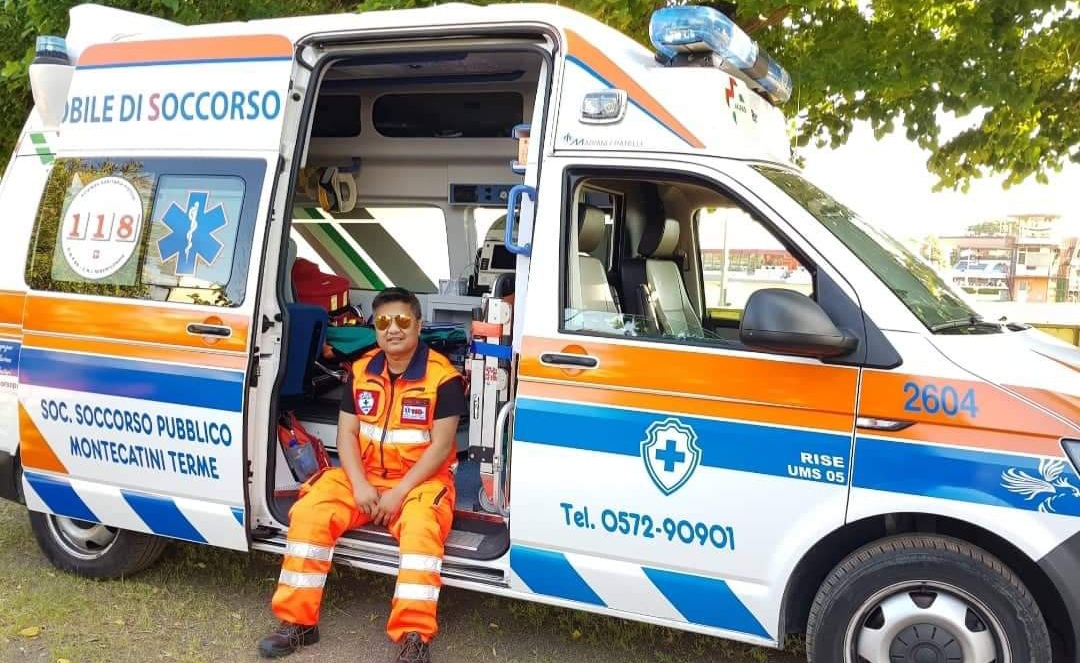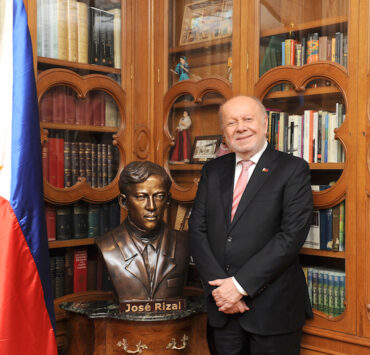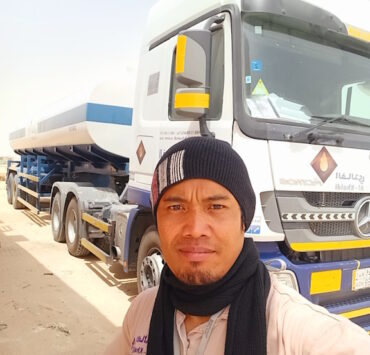The Filipino Expat Magazine talks to three kababayans whose jobs put them behind the wheel and take them to uncertain roads. Roads where they defy exhaustion, danger and even nature’s wrath. Roads where they learn to embrace the adventure, the excitement, the unexpected. In this article, Quintin Cavite, an emergency responder in Italy, shares how he save peoples’ lives in the face of death.
In 2015, Filipino frontliner Quintin Cavite, 43, was inside a bar in Montecatini Terme, Tuscany, when a man donning a rescue force uniform entered the place. Quintin saw this as an opportunity to inquire how they could avail the service of the responders every time they would organize events in the Pinoy community as the presence of emergency responders in all social events is obligatory in Italy. The rescue officer obligingly answered all the queries but not without asking, “Why not train to be one?”, a question that would make Quintin reconsider his professional life.
A fan of TV shows like Chicago Fire and 911, he loves the adventure, the adrenaline rush that comes with it. So Quintin joined the Societa Soccorso Pubblico Montecatini Terme to become a responder.
He took his training seriously and after only three months, he was promoted from being an observer to third responder, executing the orders of the team leader. Three years later, he became a first responder, behind the wheel of an ambulance providing assistance to emergency situations.
Sight and smell of death
Montecatini is a relatively peaceful town and crime rate is low. Except for infrequent traffic accidents and petty crimes, the common incidents happen indoors, mostly old people slipping, falling or having a heart attack in their homes. Suicides normally happen in the cold season.
Although Quintin finds his job routinary, some incidents still shake him to the core.
“I once saw the disintegrated body of a man who threw himself on to the train. His brain was all over the place.” The image stayed with him even after the intervention, a psychological support given to first responders after a traumatic rescue. “I hadn’t been smoking for 15 years but I still carry cigarettes in my pocket to distract me from the smell.”
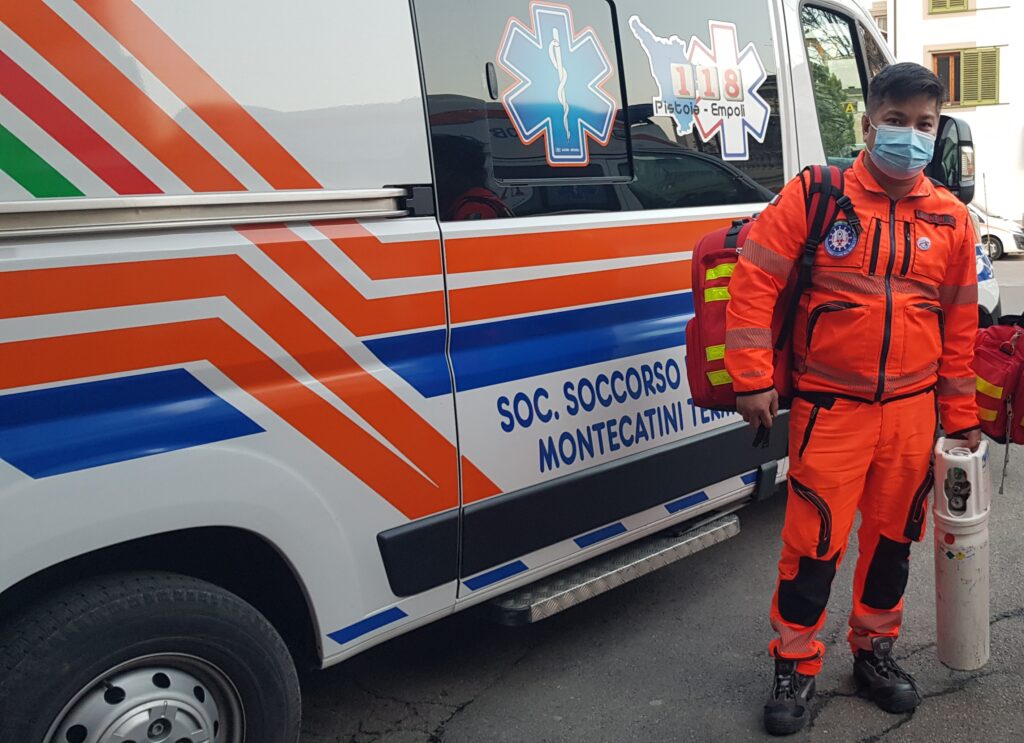
Quintin recalls the time when he and his wife saw a card accident on their way home. A 7-year-old girl was pinned in the wall and her mother was lying on the ground. “When I saw the kid, I froze. She was still holding an ice cream and balloon. I went back to the car, told my wife to check on the victims. I know we need to be brave but our bravery is only up to a certain point. When it touches your personal life, the effect on you is strong. We don’t have kids but we have a niece who is like our own child. That instant, I thought of her so I blacked out. I couldn’t move.”
He admits that this is a tough job, not all excitement and adventure. A case can affect him psychologically especially when personal emotions take over. But he tries his very best not to be weighed down by any emotional burden, telling himself that he is there to help people.
Becoming an emergency rescuer
As far Quintin knows, he is the only Pinoy responder in the region. He sometimes invites his Pinoy friends to join him. A rescuer earns between 1,400 -1,800 euros working six hours a day. He is aware though that the primary reason why there is no taker is the language.
“Language is very important. This is not trial and error. Precision is a necessity. Every movement, every word is recorded. If somebody dies and it was because of a misunderstanding caused by a language mixed-up, it will be a terrible mistake.”
Because of this, he encourages his kababayans to learn Italian seriously to be able to explore other professions.
Originally from Naga, Quintin came to Italy in 1999 when he was 21 to study Philosophy in Rome. Three years later, he juggled between the Philippines and the US working as the marketing officer of their family publishing company in New York. But he couldn’t see his future in either countries. In 2006, he moved back to Italy to study Psychology. This time, he came to live in the tranquil town of Montecantini Terme.
“Language is very important. This is not trial and error. Precision is a necessity. Every movement, every word is recorded. If somebody dies and it was because of a misunderstanding caused by a language mixed-up, it will be a terrible mistake.”
Quintin Cavite, Filipino frontliner in Tuscany, Italy
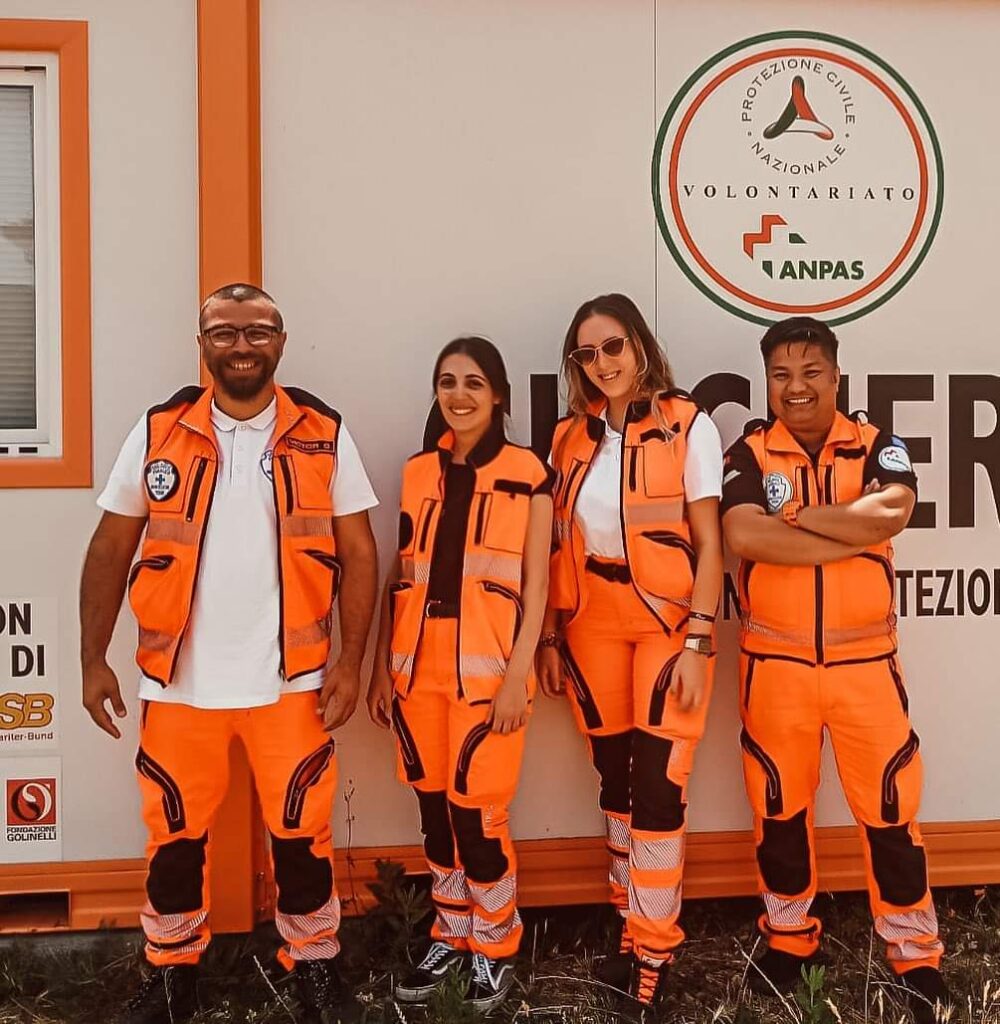
The following years would see Quintin slowly building a simple life in this quiet town. He would also meet his wife and land a job as a disability personal assistant, working with persons with disabilities within the government’s Independent Living program. “When persons with special needs turn 18 and want to live independently, my job is to assist them in their daily activities and help them in their psychological growth which involves dialogues and therapies.”
“In my mind, I believed I was strong. But sometimes, our spirits were down but the government supported us and the people cheered us on. It was heartwarming to see them applauding on their balconies.”
Quintin Cavite, Filipino frontliner in Tuscany, Italy
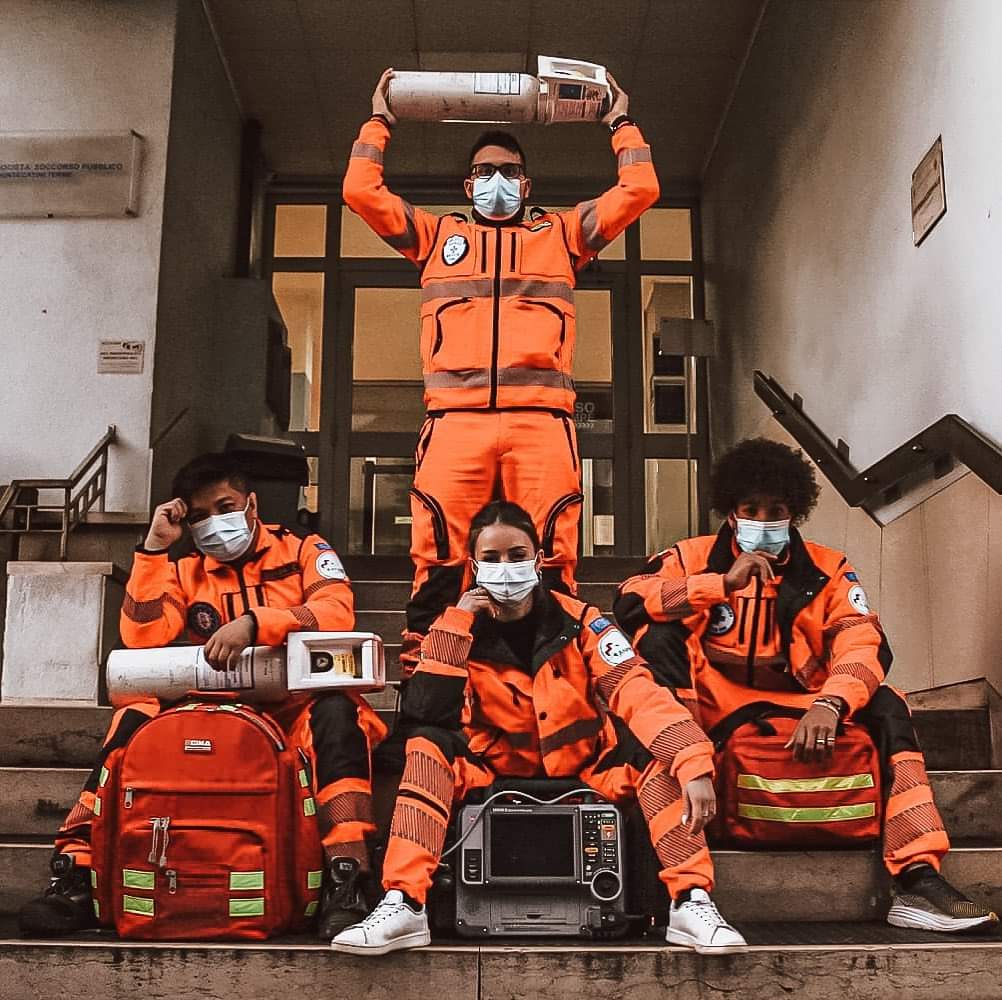
At the frontline of fires and pandemic
During the pandemic, Italy suffered badly. Thousands of people died and Quintin and his team were shoved to the frontline to battle an invisible enemy. “We were fighting against something we didn’t know. Some of my teammates refused to work not wanting to risk their lives and their families. It was very challenging and scary. We had to save lives but we didn’t know how.”
He describes his ordeal rushing to people’s houses.
“We were wearing PPEs but they proved to be uncomfortable especially when breathing, plus the vision was blurry. In Italy, the houses are old and without lifts so we ran up to the 5th floor, carrying all the gear, backpack, oxygen tank, fully covered and with the family members screaming for us to hurry up.”
At some point, Quintin didn’t feel frightened. “In my mind, I believed I was strong. But sometimes, our spirits were down but the government supported us and the people cheered us on. It was heartwarming to see them applauding on their balconies.”
After COVID-19, another enemy threatens the safety of the region. Wildfires have become a common occurrence in Tuscany that have destroyed hundreds of hectares of forest. Every summer from mid-June to September, Quintin volunteers as a firefighter at the Vigilanza Antincendio Boschivo (VAB) Massa e Cozzile Toscana, giving support to the local firemen. He and his team help put out the wildfires in Montecatini and its neighbouring town of Lucca.
“This is the advantage of not having kids. We can do other things,” explains Quintin when asked how he manages to squeeze volunteering in his tight schedule, adding that his wife is also busy with her apostolates and him, aside from his jobs and volunteer works, he is also active in the Filipino community. As the national president of Guardians Emigrant Cluster Legions and one of the National Councilors of OFW Watch, he is involved in organizing social events as well as giving assistance to poor communities in the Philippines. “I also play football three times a week with my Italian friends. It’s all about time management.”
“I know we need to be brave but our bravery is only up to a certain point. When it touches your personal life, the effect on you is strong.“
Quintin Cavite, Filipino frontliner in Tuscany, Italy
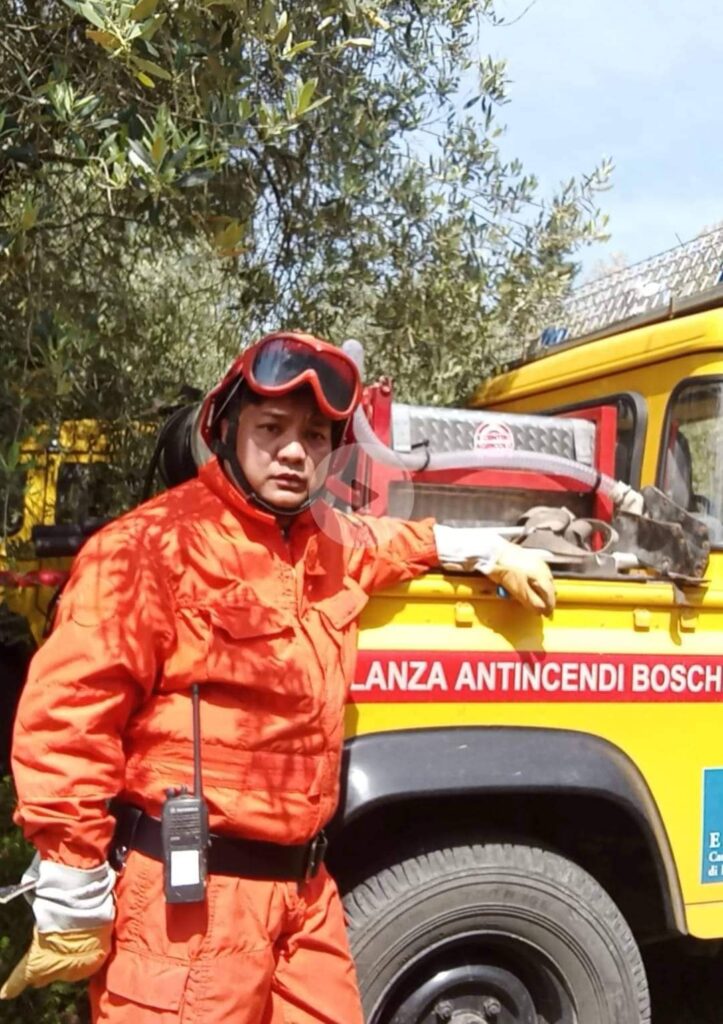
Helping others is both a calling and second nature to Quintin. When he was a teenager, he put out a fire in a neighbor’s house unmindful of the danger. At present, Quintin enjoys being a responder and a disability personal assistant at the same time, two jobs that are physically and psychologically daunting but for him, they make him feel alive and happy. Over the years, Quintin has invested a lot of dedication and passion in his work that serving others has become an integral part of his life as an expat.

